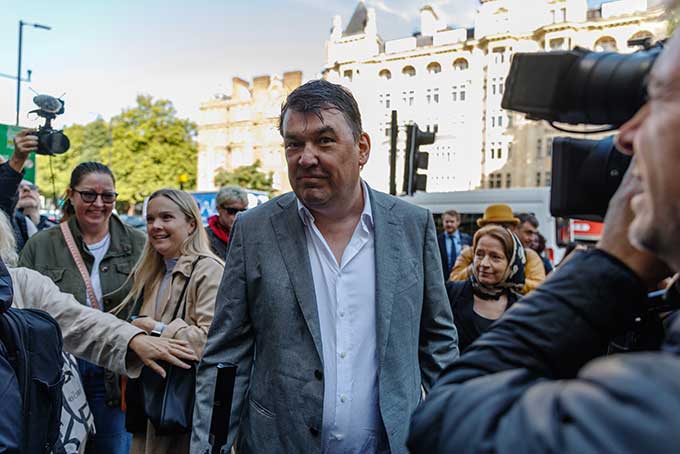“Free speech is at the lowest ebb it has been in Britain since the eighteenth century,” the U.K. Free Speech Union’s founder and president Toby Young, recently ennobled, told me over lunch at the House of Lords last week. The Peers’ Dining Room was sedate—the average age in the upper house of Britain’s parliament is 70—but beyond the Palace of Westminster’s well-guarded gates, the United Kingdom is in crisis, especially in the realm of free expression. Since Sir Keir Starmer’s Labour Party returned to power last year, Young’s organization—which offers advocacy and representation for people facing consequences for their speech—has seen membership skyrocket. It’s risen from 14,000 in July 2024 to 35,000 now, he says, alongside a record number of requests for help.
Two days before our lunch, “Unite the Kingdom,” one of the largest demonstrations in Britain’s modern history, drew a crowd of well over 100,000 people into London’s streets. It was led by controversial free-speech activist Tommy Robinson, often derided as “far-right” and whose own views have gotten him in trouble with the law. Hundreds of police officers cordoned off Trafalgar Square, leaving open a small corridor to Nelson’s Column, where a vanguard of marchers sang “God Save the King,” “Rule Britannia,” and other patriotic songs. Many waved the Union Jack or the St. George’s Cross—the flag of England—both of which have become popular symbols of national sovereignty and resistance to Starmer’s increasingly disfavored government.
The country’s current government, though, would have the world believe nothing is wrong. “We’ve had free speech for a very, very long time in the United Kingdom, and it will last for a very, very long time,” Starmer said during an Oval Office visit in February. At a joint press conference with President Trump during the American leader’s state visit to the U.K. earlier this month, Starmer promised to guard free speech “jealously and fiercely,” calling it one of his country’s “founding values.” Nevertheless, many in Britain feel the country’s censorship laws have gone too far. The Online Safety Act, for example, passed in 2023 and fully in effect as of July, accords government regulators broad authority over forms of expression they deem offensive, indecent, obscene, or menacing. Older legislation still on the books prohibits communication intended to cause distress, anxiety, or annoyance—even more elusive categories.
British authorities are not slouching in enforcement. According to police records analyzed by the London Times, over 12,000 Britons per year are arrested for speech-related offenses—an average of 30 per day and nearly a fourfold increase over the 2016 figure. Recent cases have reportedly included arrests for derogatory comments about migrants, displays of the national flag that others found offensive, and even silent prayer near abortion clinics. Since 2014, police can record comments merely perceived as offensive as so-called “non-crime hate incidents,” which remain on the offending party’s record even if no charges are filed.
Britain’s free speech laws have an international dimension, as Vice President J. D. Vance observed earlier this year, when he noted that they could affect U.S. companies and individuals. The Online Safety Act imposes a heavy burden on platforms of any nationality—though most are, of course American—to remove content that the U.K. considers criminal. Noncompliance can result in a fine of 10 percent of the offending company’s net global revenue, up to a maximum penalty of £18 million.
During civic unrest last summer, London’s metropolitan police commissioner Sir Mark Rowley threatened to “come after” people anywhere in the world whose online rhetoric violated British law. Rowley singled out X’s owner Elon Musk among high-profile figures he claimed were “whipping up . . . hatred.”
In case anyone thought Sir Mark was kidding, earlier this month five armed police officers detained Irish comedian Graham Linehan upon his deplaning at Heathrow Airport, in response to allegedly “transphobic” X posts that Linehan made from his home . . . in Arizona. A national meltdown ensued, with even Starmer suggesting that the police had gone too far in Linehan’s case. Sir Ed Davey, who leads Britain’s center-left Liberal Democratic Party, recently renewed calls for Musk’s arrest, confirming that he considers the tech entrepreneur a “criminal” for comments Musk made on X.

If Britain’s free speech crisis is an international problem, could it have an international solution? Liz Truss, a former Conservative prime minister who tells me she is “ashamed of the state of free speech in Britain,” is in the process of creating a new international media network, including a U.S. component, “to take on the censors and reclaim our right to free speech.”
Such initiatives may help, though Lord Young believes the surest solution would be “a major overhaul of our free speech laws and their replacement with something like the First Amendment.” “That’s not going to happen under the present government,” he lamented, but reformers have other options in the four years that remain before the U.K. must have new elections.
“Starmer is so desperate for a trade deal with the U.S. to shore up his failing premiership he would be willing to accept one on almost any terms, including scrapping some of our anti-free speech laws. I hope the State Department takes advantage of that opportunity,” Young said, before suggesting that Americans “continue to apply pressure” through diplomacy.
Regardless of tactics, free-speech defenders should maintain the transatlantic dialogue until a reformist government comes to power in the U.K. Nadine Strossen, who served as president of the American Civil Liberties Union back when that organization truly cared about free speech, wrote me that “all of us free speech advocates everywhere can help each other by sharing resources and ideas. The information/assistance flow is in both directions!”
Britain may be in a bad place, but a new chapter in our “special relationship” could be opening.
Top Photo by Christopher Furlong/Getty Images
City Journal is a publication of the Manhattan Institute for Policy Research (MI), a leading free-market think tank. Are you interested in supporting the magazine? As a 501(c)(3) nonprofit, donations in support of MI and City Journal are fully tax-deductible as provided by law (EIN #13-2912529).


















